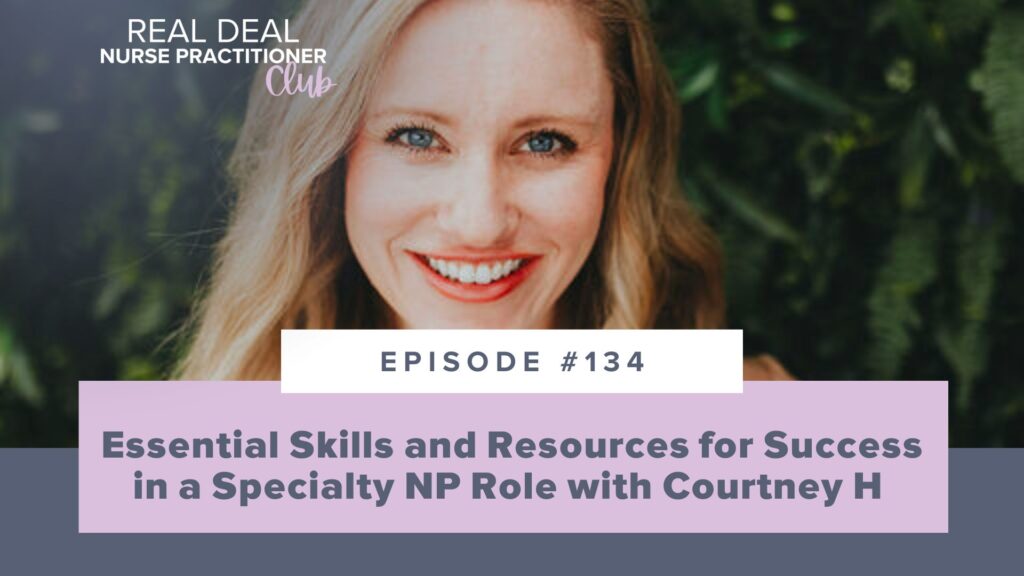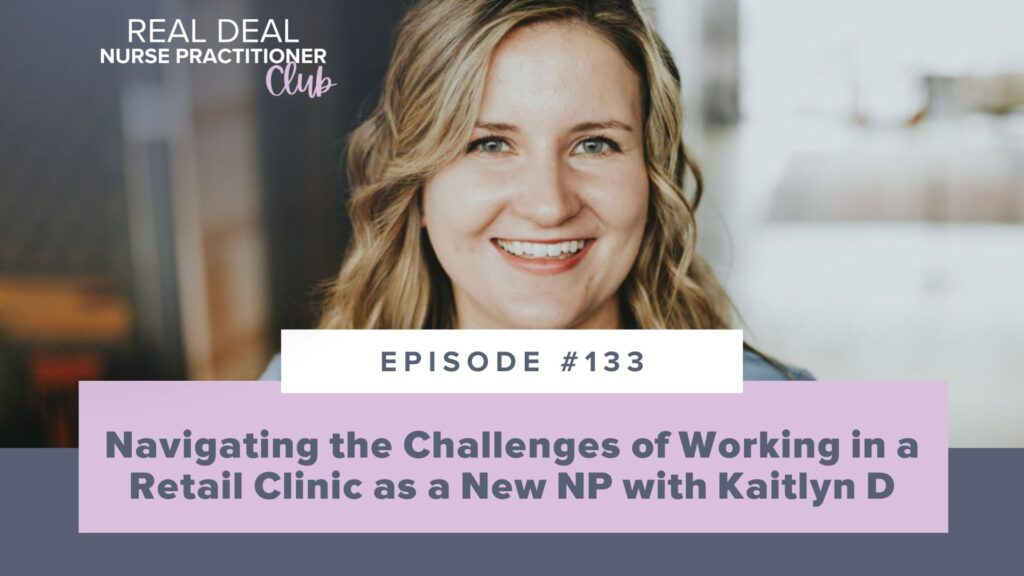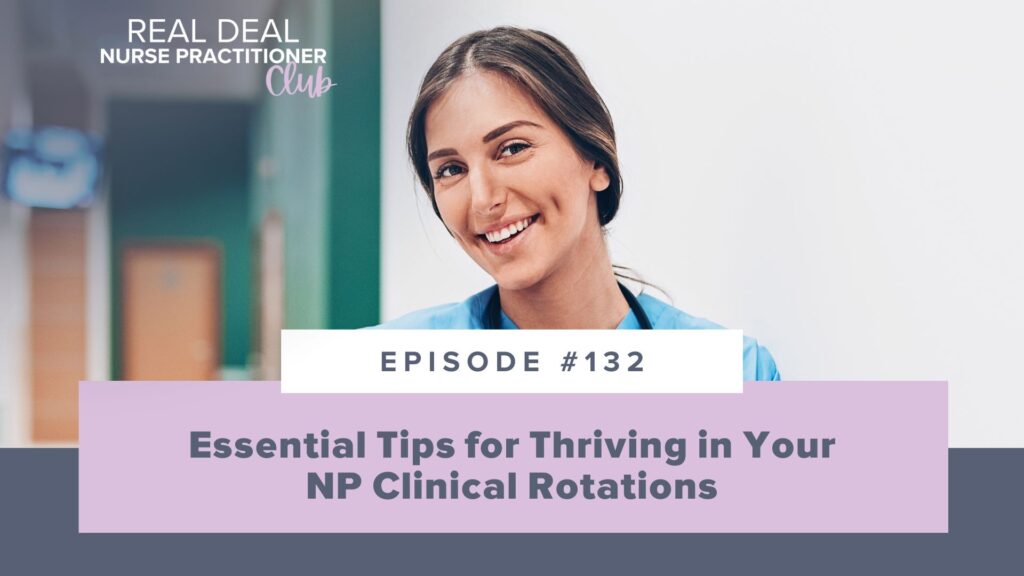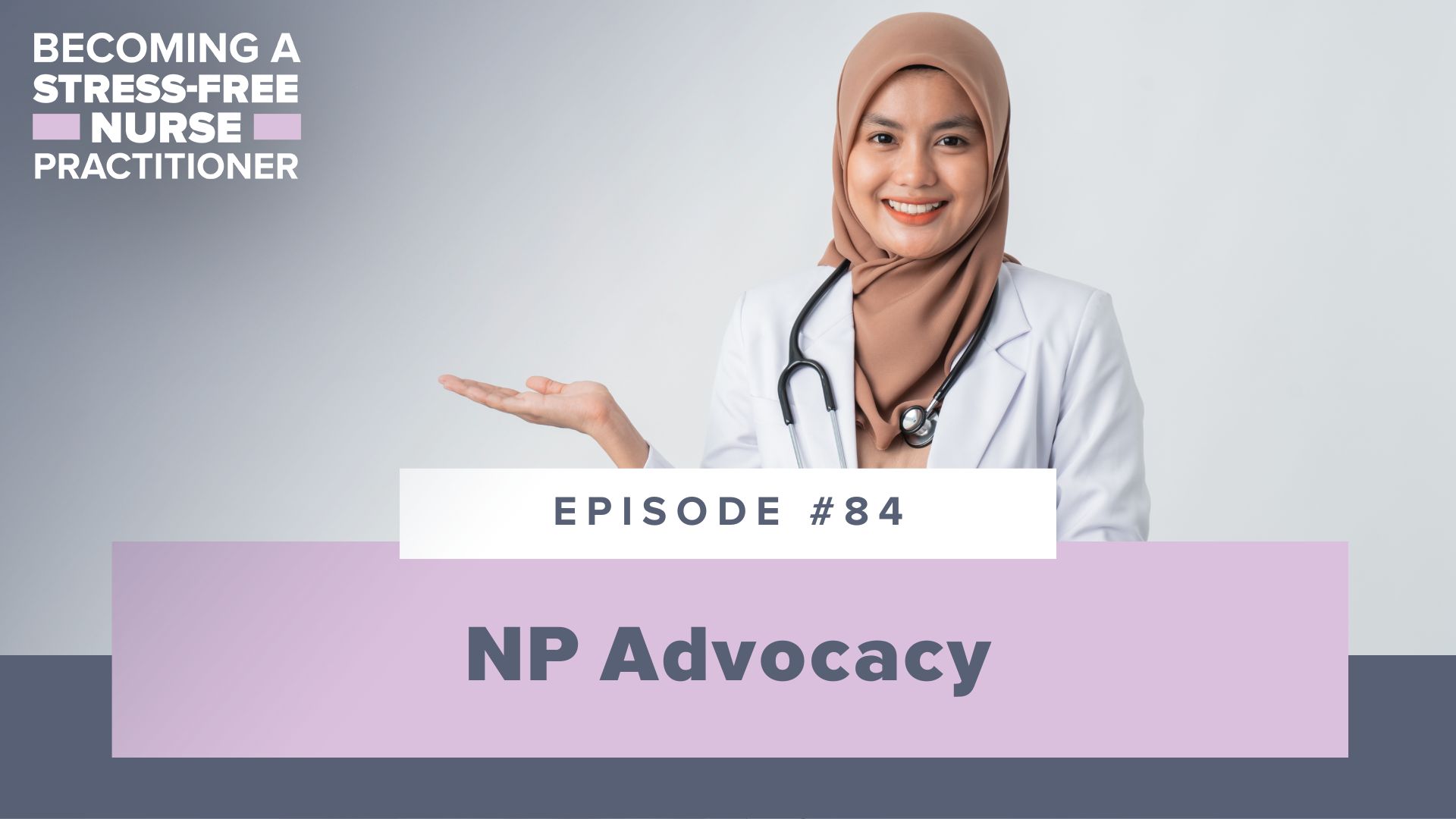
Today, I’m talking about a hot topic especially for new Nurse Practitioners: Advocacy for NPs. As Nurse Practitioners, we know how large of a role we play in the healthcare setting but advocating for ourselves and our profession is a vital part of continuing to grow in our role.
If you want to grow and evolve as an NP and gain more autonomy, this episode is for you. Nurse Practitioners have been in a battle to advocate for their position for decades. I’m bringing some awareness to the history of NP advocacy and showing you how this works in practice.
Tune in this week to discover the history of NP advocacy and some of the changes Nurse Practitioners want to see in the industry. I’m sharing what advocacy involves for Nurse Practitioners and the work we still have to do in continuing to grow and evolve the profession of nursing as a whole.
If you’re looking for support, no matter what phase of your nurse practitioner journey you’re currently in, I have communities available for both students and new nurse practitioners. In these communities, we work to uplift one another and grow this profession together every day, so click here to check them out!
What You Will Discover:
- What it means to advocate for your position as an NP and why we do it.
- How Nurse Practitioners have been advocating for their position since the start of nursing as a profession.
- Why advocacy is a huge part of why Nurse Practitioners are recognized as an important role of the healthcare system.
- The work we still have to do when it comes to NP Advocacy.
- How to get involved with NP advocacy and push our profession forward.
Featured on the Show:
- If you’re looking for extra support, I have communities available for both students and new nurse practitioners. Click here if you’re a student, and click here if you’re a new NP!
- The American Association of Nurse Practitioners
- American Nurses Association
- Kaiser Family Foundation
Full Episode Transcript:
Welcome to Becoming a Stress-Free Nurse Practitioner, a show for new NPs and students that want to pass their board exam the first time and make that transition from RN to NP as seamless as possible. I’m your host Sarah Michelle. Now, let’s dive into today’s episode.
Hello, my friends. I hope everyone’s having a great week, a great month, I feel like we are finally getting a little bit settled into 2023. It’s the end of quarter one. The days are getting longer, which for me just helps with my attitude and my mental health so much. And spring literally happened yesterday, which means those long summer days are coming very, very soon.
And so today in this excellent mood I’m in, with spring on the horizon and summer coming soon, I would like to talk about a hot topic that I hear other nurse practitioners, especially in that new nurse practitioner Facebook group we have, talk about all the time. And that is actually the topic of nurse practitioner advocacy.
So we, as nurse practitioners, know how large of a role that we play in the healthcare setting, but advocating for ourselves and our profession is still such an important part of continuing to grow in our role. So we want to evolve. We want to be able to gain more autonomy, which we’re going to talk about.
And so nurse practitioners have been advocating for their profession for decades. Like literally since the start of the profession we’ve been in this battle. And advocacy itself is just the act of supporting or promoting a particular cause or policy. And we have been working to increase recognition of our role in health care, and ultimately big goal wise, gain autonomy in practice.
Now, as I’m sure most of you are aware, nurse practitioner roles vary greatly from state to state. So some states are going to allow for us to have full practice authority. Some are going to require us to practice under a physician. And then a lot falls somewhere in the middle. So it can feel really chaotic and all over the place.
And when you’re working as an RN, there are compact states available, where basically your license translates state to state. We don’t have that at all right now as a nurse practitioner, and that can be a really limiting factor and thing.
So to talk just a little bit here about the history of nurse practitioner advocacy, why this is so important. This can be traced all the way back to the 1960s. And that was when nurse practitioners were first recognized as healthcare providers. At that time we were primarily seen as nurses who just received some additional training, and the role was pretty limited.
Nurse practitioners were not allowed to practice independently at all. And they had to work under the supervision of a physician. However, our healthcare system began to change, our healthcare system began to evolve. And that demand for primary care really started to increase.
And all of a sudden, all these nurse practitioners began to advocate for recognition of their skills and abilities. Especially as all nurse practitioners come from a nursing background and we are so knowledgeable about practicing medicine.
Now, the 1970s nurse practitioners began to form professional organizations for the first time, such as the National Association of Nurse Practitioners of Family Practice and the American Academy of Nurse Practitioners, which I’m sure most of you know is AANP. And these were specifically created to promote the NP profession and advance our practice.
And these organizations work to educate the public, and more importantly lawmakers, about the value of nurse practitioners as healthcare providers and allow for us to advocate for changes in laws and regulations that would allow for us to practice independently. And they’re still doing it today, too.
Today, as we know, the nurse practitioner profession has grown significantly, and NPs are recognized as an important part of the healthcare system. We are licensed and regulated in all 50 states, and now we have the authority to diagnose and treat patients, prescribe medications, order and interpret diagnostic tests. And we also have the ability to practice independently in several states, although some states still have very restrictive laws and regulations in place.
Despite the progress that has been made in the recognition of nurse practitioners as healthcare providers, there’s still so much work to be done in terms of NP advocacy, and that’s really the point of this episode. So we, as nurse practitioners, continue to face challenges in terms of reimbursement for service and just limitations on our ability to practice independently and to the fullest of our licenses.
We see this in states where nurse practitioners must be supervised by a physician and are not able to practice on their own. And all too often nurse practitioners are not receiving the same level of reimbursement as physicians are, which makes it difficult for them to provide care to patients who are uninsured or under-insured.
Nurse practitioners must work to advocate for fair reimbursement for their services so that we can continue to provide quality care to all of our patients, regardless of insurance status. If you’ve taken any of our courses, you definitely have heard about incidental billing, which basically says that we as nurse practitioners cannot bill to the full extent of services we provide, unless a physician is physically present.
Now, there’s some caveats there, there’s some cadence there. But incidental billing is a real thing. Rules like these were originally intended to protect patients. But as our role as nurse practitioners has grown, and has grown so rapidly, it is time to start challenging these rules and laws to allow us to provide the patient care that we are capable of.
It also really limits what we can do as nurse practitioners, which takes away from us professionally, but also takes away from our patients. A huge point that I always like to bring up is that as a whole, there is a healthcare professional shortage that is going on right now.
And in fact, there was a report from the Kaiser Family Foundation in 2021 that found about 83.7 million people in the United States live in a designated primary care health professional shortage area. That means there are almost 84 million people in the United States that do not have immediate or any access to a primary care provider. How can we be in 2023 and this still be the case?
And in response to this, nurse practitioner advocacy also includes efforts to increase diversity and representation within our profession. We are a diverse group of healthcare providers, but there’s still a lack of diversity in terms of ethnicity among nurse practitioners.
The shortage of nurse practitioners in rural and underserved areas, where access to primary care is often limited, can be addressed by advocating for nurse practitioners to practice with full authority. Thus allowing for further reach without having an oversight by a physician.
And by increasing diversity within our profession and working to recruit and retain nurse practitioners in underserved communities we can help to improve access to primary care for all patients. We just play such an important role in the outpatient primary care setting that you would think this will be driving lawmakers and states to expand our practice authority. But there are so many barriers that remain and are being continuously implemented all the time.
In order to address these challenges, we have to continue to advocate for the profession. This can be done through a variety of means including lobbying state and federal lawmakers, working with professional organizations, and really just educating the public about the value of our profession as healthcare providers.
Additionally, nurse practitioners must continue to work to improve our own education and training so we can provide top notch, highest quality care to our patients. I personally see all the time in that new NP group I’m always talking about that people are looking for more ways to improve their knowledge and skills. And it is so, so important that we show the public and lawmakers that we are always looking to improve and learn more.
It is important to assess the role you have in your practice setting, understand your current practice authority, determine any healthcare gaps, and assess how you can help fill those gaps. By doing this, and through continuing education, our profession can continue to grow, and hopefully continue to gain the respect that it deserves in the medical community.
We’ve made a lot of strides, but we still have a long way to go. We’ve been talking about this whole episode so far that advocacy is so important. But the real question is, how do we go about it? What does it mean to actually advocate for our profession?
The easiest way, like the lowest barrier of entry that I can see, is to get involved with a national organization that you might already be a part of, like the American Nurses Association or ANA, or AANP like we talked about earlier. Both of these organizations advocate for our role and help push our practice authority further. And they help to outline the importance of NP full practice authority, which is a great way for us to educate those around us, whether it be other healthcare workers, patients or lawmakers.
Some of the largest reasons outlined by these, in addition to, of course, the improved access to care or decreasing costs, that’s a big one people like to hear. Streamlining care, another big one, and giving patients a choice in who cares for them.
Another really great way to get involved and help advocate for the nurse practitioner role, as well as educate the community, is to get involved in your local Community Nurses Association, even in states that have that full practice authority granted.
Continuing to educate and advocate on behalf of all nurse practitioners is a wonderful way to push our profession forward. Every state has its own Nurses Association. And getting involved is a great way to gain knowledge, network, and help other nurse practitioners around your own community, and just build a mini community for yourself.
Never underestimate the power of networking, especially when you’re brand new. Because you’re going to want those resources and ultimately, you’re going to want some friends by your side.
Something we’ve talked about in previous podcast episodes is when you work as a nurse, you’ve got this team approach all the time. But oftentimes, especially if you’re a nurse practitioner working in an underserved or rural area, you can feel alone and on an island. So by connecting with these community associations and more local organizations, you can build up your own network and hopefully retain yourself in the profession as well.
So I want to end this episode by talking about some barriers to nurse practitioner advocacy for expanded care. In states with restrictive scope of practice laws, nurse practitioners are not able to practice to the full extent of their education and training without that physician oversight.
This includes restrictions on diagnosing and treating certain medical conditions, prescribing certain medications, and ordering diagnostic tests. Or if you remember from our episode with the AANP president Stephen Ferrara, we were talking about diabetic shoes in the episode and how asinine it is that nurse practitioners cannot prescribe diabetic shoes.
So mandatory physician supervision is another barrier to full practice authority for NPs. And that means that NPs are required to have a physician oversee or approve their work, even though we’re fully qualified and trained to provide that care independently.
Limited prescribing authority is another barrier to our practice. In some states nurse practitioners are restricted in the types of medications they can prescribe, the dosage they can prescribe, or the conditions they can prescribe for, which as you can imagine, really presents a barrier to providing patient care. And these barriers not only limit the abilities of nurse practitioners to provide high quality, cost effective health care, but also contribute to health care disparities and limit access to care, once again, in those rural and underserved areas.
Advocating for full practice authority for our profession is important to ensure that all of our patients have access to high quality, cost effective health care. It also helps to alleviate that primary care physician shortage and allows for us a practice to the full extent of our education and training.
So, as you can see in this episode, advocacy is an ongoing effort that has been instrumental in the recognition of nurse practitioners as a whole as healthcare providers, and contributes to the growth of our profession. However, even though we have made many strides, there’s a lot of work to be done in terms of reimbursement and that ability to practice independently.
So we must continue to advocate, advocate, advocate through lobbying, working with those professional organizations, and really just educating the public so we can continue to improve the quality of care that we provide to our patients.
I know that the times are changing and this is something that we can accomplish. I hope this is something that I see in my lifetime, that in all states we have that unrestricted practice. And you will always find me and my team pushing an advocate for how important we are as a profession to the healthcare system.
So hopefully I left you with some things to think on. And hopefully after this episode, too, think of just one action step. What is one thing you could do today, even if you just sign up for AANP or a local organization, what is one thing you can do today to push us forward? Because if we all just do one thing, imagine how far we could go.
As an extra bonus, friends, if you’re looking for support no matter what phase of your nurse practitioner journey you’re currently in, I have communities available for both students and new nurse practitioners. In these communities, we work to uplift one another and grow this profession together every single day. Links to join will be included for you in the show notes.
Thanks for listening to Becoming a Stress-Free Nurse Practitioner. If you want more information about the different types of support we offer to students and new NPs, visit https://www.npreviews.com/resources. See you next week.
Enjoy the Show?
- Don’t miss an episode: follow the podcast on Spotify, Apple Podcasts, Stitcher, or RSS.
- Leave a review in Apple Podcasts.
Search the Blog
Join our Facebook Group!
Get FREE support and encouragement from thousands of FNP/AGPCNP students and our NP Support team.
Learn More3 Study Hacks to Conquer Your NP Exam!
Download these tips that have helped thousands of students pass their NP board exams.
Download NowInstitutional Partnerships
Are you a faculty member and would like to bring Sarah Michelle’s resources to your school? Email us at nursinggroups@blueprintprep.com for special institutional pricing or click on the link below to learn more.
Learn MoreGroup Discounts
Are you a student and have 10 or more classmates interested in purchasing Sarah Michelle’s courses? Email us at nursinggroups@blueprintprep.com for special pricing.
